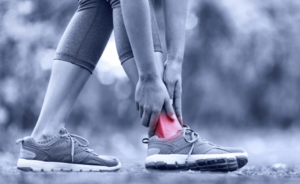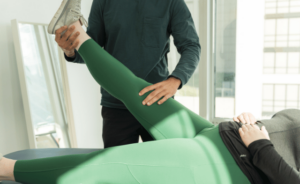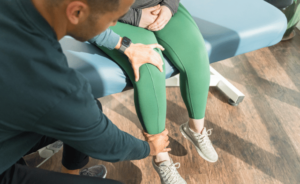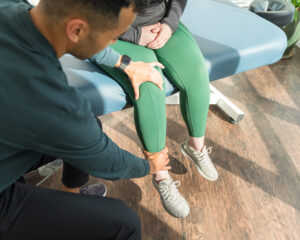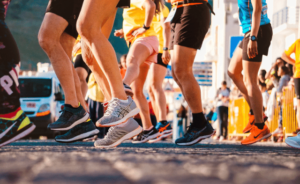Introduction: Overcoming Achilles Tendonitis for Vancouver Runners
Running is a favorite activity for many in Vancouver, whether it’s along the stunning seawall, the trails of Stanley Park, or training for the Vancouver Marathon. But with increased running intensity comes a higher risk of injury—Achilles tendonitis is one of the most common. If you’re struggling with this painful condition, physiotherapy can be the key to speeding up recovery and preventing future injuries.
At Vancouver Physiotherapy Hub, our team of specialized physiotherapists understands the unique challenges runners face. With customized treatment plans, we help you get back to running stronger and pain-free.
What is Achilles Tendonitis?
Achilles tendonitis is an overuse injury affecting the tendon that connects the calf muscles to the heel bone. It often occurs when runners increase their training volume or intensity too quickly without enough rest. The result is inflammation, pain, and stiffness, especially during physical activities like running.
This condition is particularly common among runners since the Achilles tendon absorbs significant impact with each step. Without proper treatment, it can lead to more severe issues, such as an Achilles tendon rupture, which might require surgery and a long recovery period.
Symptoms of Achilles Tendonitis
Common symptoms of Achilles tendonitis include:
- Pain and stiffness in the heel or lower calf
- Swelling along the tendon
- Tenderness when touching or moving the affected area
- Increased pain after physical activity, particularly running
- Limited ankle mobility
If you notice any of these symptoms, it’s essential to seek professional help to avoid worsening the injury.
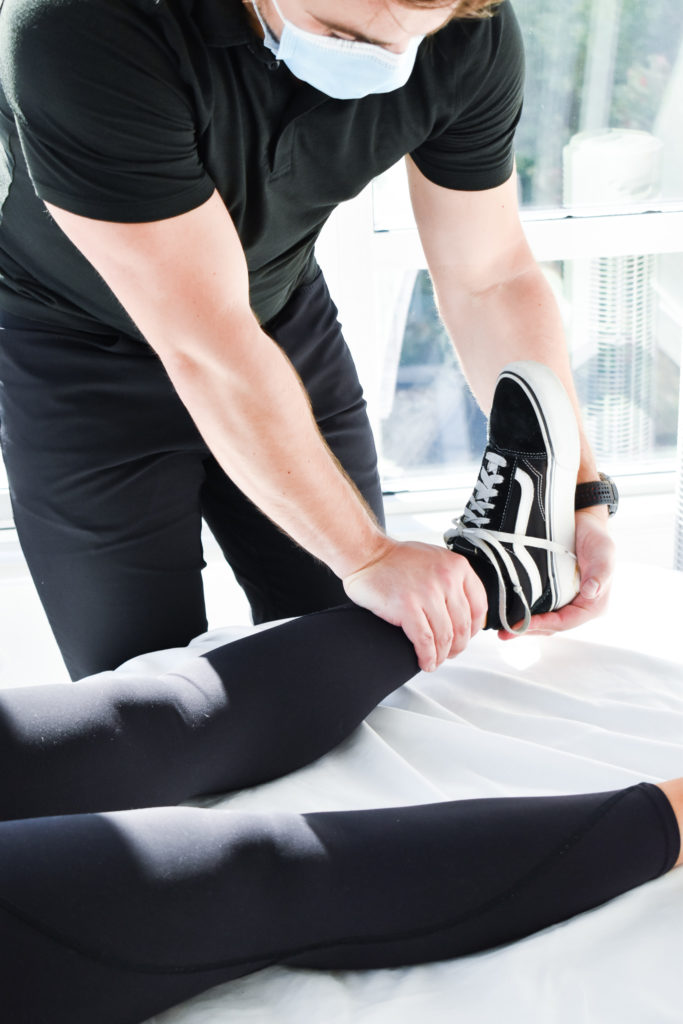
How Physiotherapy Can Help Achilles Tendonitis
Physiotherapy is one of the most effective ways to treat Achilles tendonitis. At Vancouver Physiotherapy Hub, we take a holistic approach to running injuries, focusing not only on pain relief but also on addressing the root cause. Here’s how we can help:
1. Comprehensive Assessment
Our physiotherapists begin with a thorough assessment of your injury, including an analysis of your running form and training routine. We identify contributing factors like poor technique, muscle imbalances, or improper footwear. This detailed evaluation allows us to create a tailored treatment plan for your recovery.
2. Manual Therapy
Hands-on techniques, such as soft tissue massage, joint mobilization, and myofascial release, reduce inflammation and improve blood flow to the injured area. These therapies help speed up healing while relieving pain and stiffness in the Achilles tendon.
3. Stretching and Strengthening Exercises
Our therapists guide you through targeted stretches and exercises designed to strengthen the calf muscles, improve ankle flexibility, and enhance overall mobility. This not only helps in recovery but also reduces the risk of re-injury.
4. Biomechanical Correction
If your running form is contributing to Achilles tendonitis, we’ll work with you to adjust your gait and improve your mechanics. Correcting issues like overpronation or poor posture can help you run more efficiently and reduce the strain on your Achilles tendon.
5. Gradual Return to Running
Returning to running too quickly can cause setbacks. Our physiotherapists can design a graded return-to-running program that allows you to safely increase your mileage while minimizing the risk of re-injury.

Preventing Achilles Tendonitis in the Future
Preventing Achilles tendonitis requires a balance of strength, flexibility, and proper technique. Here are a few tips to help reduce your risk:
1. Warm-Up Properly
Before each run, start with dynamic stretches and exercises to prepare your muscles and tendons for the demands of running. A proper warm-up reduces the likelihood of injury.
2. Strengthen Your Calves and Ankles
Focus on exercises that target the calf muscles and tendons around the ankle, like calf raises and eccentric heel drops. Strengthening these areas fortifies the Achilles tendon and prevents strain.
3. Gradually Increase Mileage
Sudden increases in mileage or intensity often cause Achilles tendonitis. Follow the 10% rule: don’t increase your weekly mileage by more than 10% to allow your body time to adapt.
4. Wear Proper Footwear
Ensure you’re wearing supportive running shoes that fit your foot type and running style. Your physiotherapist may also recommend custom orthotics to address biomechanical issues.
5. Cross-Train
Incorporate low-impact activities like swimming, cycling, or strength training to reduce repetitive strain on your Achilles tendon while maintaining overall fitness.
FAQs About Achilles Tendonitis and Physiotherapy
1. How long does it take to recover from Achilles tendonitis with physiotherapy?
Recovery time varies depending on the severity of the injury and your commitment to the rehab program. Most runners see improvement within 6 to 12 weeks with consistent physiotherapy.
2. Can I continue running with Achilles tendonitis?
It’s not recommended to run through the pain of Achilles tendonitis, as this can worsen the injury. Rest and follow your physiotherapist’s guidance for a safe return to running.
3. Is Achilles tendonitis preventable?
Yes! Incorporating stretching, strengthening exercises, and proper running techniques can significantly reduce your risk of developing Achilles tendonitis. At Vancouver Physiotherapy Hub, we offer customized injury-prevention programs for runners.
4. Do I need a referral to see a physiotherapist at Vancouver Physiotherapy Hub?
No referral is necessary. You can book an appointment directly with our clinic to start your recovery.
5. Can orthotics help with Achilles tendonitis?
Yes, orthotics can provide extra support and correct biomechanical issues contributing to Achilles tendonitis. Your physiotherapist will assess if orthotics are right for you.
How Vancouver Physiotherapy Hub Can Help
At Vancouver Physiotherapy Hub, we understand the frustration of running injuries like Achilles tendonitis. Our team of experienced physiotherapists offers comprehensive assessments, personalized treatment plans, and ongoing support to ensure a full recovery.
Whether you’re a competitive marathoner or a recreational runner, our goal is to get you back to running pain-free. With advanced techniques, one-on-one care, and a deep understanding of running injuries, we’re your top choice for physiotherapy in downtown Vancouver.
Don’t let Achilles tendonitis slow you down. Book an appointment at Vancouver Physiotherapy Hub today and take the first step towards a faster, safer recovery.

